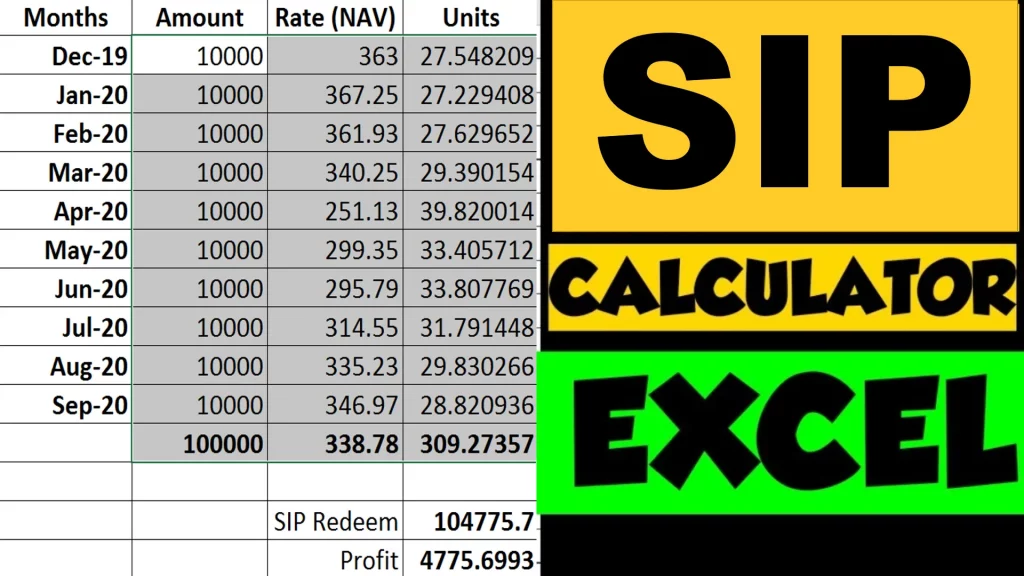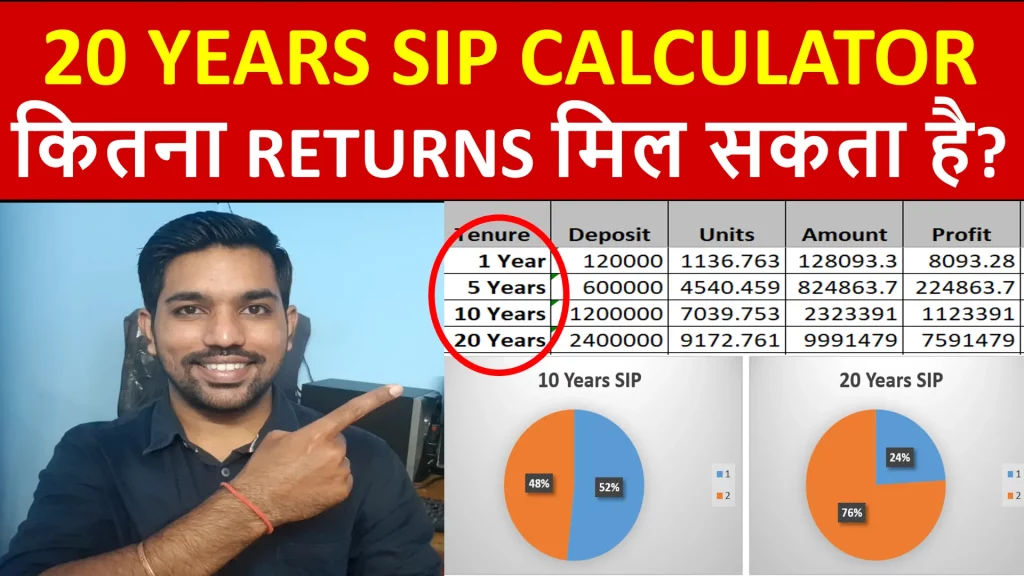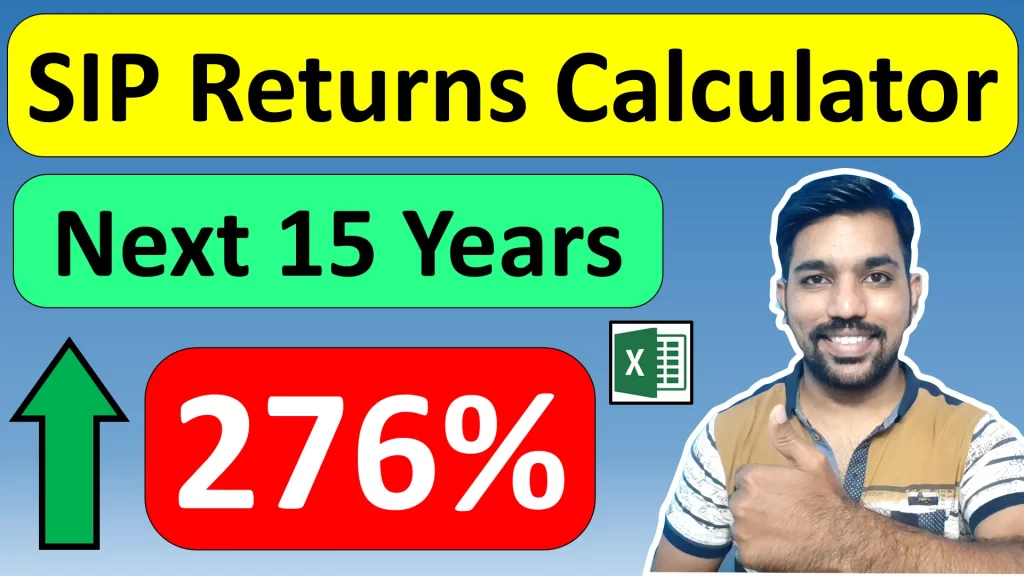There are mainly 4 types of Mutual Funds in India – Equity Funds, Debt Funds, Money Market Funds and Hybrid Funds, based on the Asset class classification. Apart from Asset class, Mutual funds can also be categorized based on investment goals, structure and risk.
Let us understand Various Types of Mutual Funds in India in detail, along with mutual fund returns calculation.
- What are Mutual Funds?
- Types of Mutual Funds in India
- What is the full form of NAV?
- Rs. 1000 Mutual Fund Returns Calculation Video
- What are the 4 types of mutual funds?
- Which Type of Mutual Fund is Best for you?
- Conclusion
What are Mutual Funds?
- Mutual funds are investment product that helps you to invest in stocks or equities of companies
- Every mutual fund is allocated a fund manager who is responsible to invest your money in direct stocks or equities
- These fund managers, after studying about the potential growth of the companies and their stocks invest your money into such stocks
- Every mutual fund unit can be bought by paying a price for single unit of mutual fund, called as NAV (Net Asset Value)
- Based on the performance of the stocks of companies and their earnings, you get profits during bull market or incur losses during bear market
- Bull Market is when the prices of stocks are rising, which helps you to increase value of your accumulated stocks
- Bear Market is when the prices of stocks are falling, which decreases the value of your accumulated stocks
- Mutual funds invest in multiple stocks after studying them so it is rare that you will lose you entire invested amount if any of the one companies from several companies is bankrupted. And that is why, Mutual Funds are less risky compared to investing in direct stocks.
Types of Mutual Funds in India
Let us now understand various Types of Mutual Funds in India that are classified based on Asset Class, Investment Goals, Structure and Risk.
Types of Mutual Funds Based on Asset Class:
We have mainly 4 types of mutual funds based on Asset class:
Equity Funds
- Equity Mutual Funds are the type of mutual funds that invest in equities or stocks of companies. Since they invest in companies stocks, that are also called as Stock Funds.
- The fund manager is responsible to select best stocks under his / her mutual funds to maximize the returns of investors.
- Equity funds have the potential to get high returns, compared to any other type of mutual funds, since they invest in stocks of companies which can grow rapidly based on the their underlying business
- The gains or losses are completely dependent on the price of the stocks these mutual funds invest in
- Also, since the returns can be high, risk associated with equity mutual funds are also high, but over long term, you can get between 10% to 15% over long term of at least 5 to 7 years
- Equity mutual funds is the best option if you are in your 20s or 30s and can take some risk to maximize your returns to achieve your long term goals
ALSO READ: Rs. 5000 in Sensex for Last 25 Years Returns Calculation
Debt Funds
- Debt Mutual funds are the type of mutual funds that invest in fixed income instruments, such as bonds, treasury bills and securities
- Fixed Income instruments can include Fixed maturity plan (FMP), liquid funds, gilt funds, short and long term duration funds, monthly income plan, etc.
- Debt mutual funds are best suited for those who are conservative in their risk and are in their 40s and 50s
- If you are looking for stable income with low risk and average returns, you can invest in Debt Mutual Funds, which invest in fixed income instruments that are less risky compared to equity mutual funds
Money Market Funds
- Money Market Funds are the type of mutual funds that are used to fulfill cash needs of the companies
- The fund manager in money market funds will invest in Treasury bills (T-bills), certificate of deposits, commercial papers, etc.
- These funds are low risk funds in nature and mainly aim to earn you interest money on your investments
- primary aim of Money Market Funds (MMF) is to reduce the fluctuations of the NAV (Net Asset Value) of the fund
- These funds will earn you dividends consistently and are less risky compared to equity mutual funds
- If you are conservative in nature and don’t want to take much risk, you can invest in money market funds
- Money market funds are good when your investment time period is less than 1 year
Hybrid Funds
- Hybrid Mutual funds are the type of mutual funds that invest in a mix of stocks are debt, also called as Balanced Funds
- The percentage of stocks can be allocated for example, 60% of the amount can be allocated to equity and remaining 40% can be allocated to debt instruments
- Hybrid mutual funds provide the benefit of equity funds – good returns and debt funds – low risk investments.
- The returns of hybrid mutual funds are lower compared to equity mutual funds since the risk taken in this fund is lesser
- So hybrid funds are in between the equity and debt mutual funds when we see returns and risk taken while investing in such funds
- If you can afford to take some extra risk for good returns compared to debt mutual funds, you can invest in Hybrid mutual funds
ALSO READ: Mutual Fund Calculator – 10 Years Returns Calculation
So there are the 4 types of mutual funds based on Asset class. Let us now understand types of mutual funds based on the Investment Goals.
Types of Mutual Funds Based on Investment Goals
Mutual funds based on Investment Goals are categorized as Growth Funds, Income Funds, Liquid Funds, Tax Saving Funds, Aggressive Growth Funds, Fixed maturity Funds, Capital Protection Funds and Pension Funds.
Growth Funds
- Growth Funds are the type of mutual funds that invest in growth companies which have potential to grow and pay less or no dividends
- Since the companies are growth oriented, the profits or earnings of companies are not given back to investors in the form of dividends, and such mutual funds are called growth funds
- These funds provide good returns and include majority of the equity stocks, but also has high risk in short term
- If you can take risk, you should invest in growth funds for better returns over long term
Income Funds
- Income Funds are the type of mutual funds that invest in companies that pay dividends or debt instruments that pay interest, that is why the name income funds
- The companies believe to provide regular dividends to investors to keep them happy, unlike growth funds where the earnings are reinvested to earn more profits
- Income Funds tend to have less returns compared to growth funds, and are less risky due to their exposure to debt instruments
- If you want regular income in the form of dividends or interest, you can invest in such income funds
Liquid Funds
- Liquid funds are similar to debt funds that invest in bonds, treasury bills, certificate of deposits, etc.
- The instruments tend to have short term maturity like 90 days, hence if you are looking to park your accumulated amount for short term, you can invest in liquid funds that might give you returns similar to fixed deposits over short term
- It is best to park your amount in liquid funds and start STP (Systematic Transfer Plan) from liquid funds to equity funds
Tax Saving Funds
- Tax Saving Funds are the type of mutual funds that helps you to save income tax
- One such mutual fund is ELSS Mutual Fund (Equity Linked Saving Scheme)
- You can invest in ELSS and save income tax under Section 80C
- You can claim maximum of Rs. 1.5 Lakh in a financial year with old tax regime with ELSS Tax Saving mutual fund
Aggressive Growth Funds
- These mutual funds are more aggressive in nature compared to growth funds
- Aggressive growth mutual funds can include mid cap and small cap stocks that are highly volatile in nature, but tend to give higher returns compared to large cap stocks
- Due to their high volatility, these funds are highly risky, but also can reward you with high returns over long term
- If you are in early 20s, it is worth investing in Aggressive growth funds like mid cap or small cap mutual funds that can provide you better returns over long term
Fixed Maturity Funds
- Fixed Maturity Plan are the type of funds that invest in bonds, securities, money market, etc. with tenure of 1 year to 5 years
- These funds have tenure similar to Fixed deposits and provide good returns in this period
- The funds are conservative in nature with low risk and low returns
- The fund manager ensures that you money is allocated to instruments that have similar maturity periods to get you better returns
Capital Protection Funds
- Capital Protection funds aims to protect your capital that you invest, so these funds invest in bonds and certificate of deposits
- These funds tend to have low risk but it is advised to be invested in these funds for at least 3 years to get good returns
- Also the returns from these and other types of mutual funds are taxable
Pension Funds
- Pension Funds are the types of funds that helps you to accumulate enough corpus that might be required after your retirement
- While you are working, you can invest certain amount of money in pension fund for your post retirement life
- It is not advised to accumulate money in your savings account to live a financially stable post retirement, no matter how big your savings is in savings account
- Many banks and financial institutions provide you pension funds you can choose from
- Also you can invest via NPS (National Pension Scheme) that helps you to invest in mutual funds are also save income tax under Section 80CCD
So these are the types of mutual funds based on Investment Goals. Let us now understand the types of mutual funds based on Structure.
Love Reading Books? Here are some of the Best Books you can Read: (WITH LINKS)
Types of Mutual Funds Based on Structure
These are mainly 3 types of mutual funds based on the Structure:
Open Ended Funds
- Open ended funds are the type of mutual funds that do not have any constraint regarding the time period during which the funds can be bought or sold or regarding the number of units that can be bought
- You can buy or sell any number of mutual fund units during any specific time period
- however, the fund house can stop the lump sum investing or new investors if they decide to stop taking more funds for some time
- Majority of the mutual funds are open ended in nature
Closed Ended Funds
- Closed ended funds have restrictions about the number of units that can be bought and the time period during which they can be bought
- Meaning the fund company cannot sell more than pre defined number of units
- In some cases, NFO (New fund offering) is issued to buy units only during specific time period
Interval Funds
- Interval funds have the characteristics of both, open ended and closed ended funds
- The funds are open for buying and and selling during specific time period, and closed during the other period as decided by the fund house
- Interval funds are good for short term investors looking to park their lump sum amount for 3 months to 12 months to get average returns
So these are the types of mutual funds based on structure. Let us now understand the types of mutual funds based on risk.
Types of Mutual Funds Based on Risk
The mutual funds can be categorized based on risk as very low risk fund, low risk fund, medium risk fund and high risk fund.
Very Low Risk Fund
- Very low risk funds include liquid funds or ultra short term funds
- These funds can be used if your investment time period is very low like 3 months to 6 months, and you cannot afford to lose your capital
- They have very low risks and investors who don’t want to take risk with their lump sum investing can consider these very low risk funds
- They can give return up to 6% in a year
Low Risk Fund
- Low risk funds can include one of the Liquid, ultra short term funds or arbitrage funds
- You can choose these funds if your investment period is 6 months to 1 year and get returns between 6% to 1 year
- These funds invest in bonds, T-Bills and certificate of deposits to keep your invested capital protected
Medium Risk Fund
- Medium risk fund tend to have more risk compared to low risk fund
- These can include Hybrid mutual funds mentioned above, to have a mix of equity stocks and debt instruments.
- Based on the allocated in equity and debt instruments, the risk can be defined
- More allocation to equity means the risk is slightly at the higher side
- More allocation to debt means the risk is slightly at the lower side
- You can get 8% to 10% returns for your investment period of 3 years to 5 years in medium risk funds
High Risk Fund
- High risk funds include equity funds that are highly volatile in nature
- They can include some large cap stocks, and more of the mid cap and small cap stocks to maximize your returns on investment in during bull run
- These are highly risky in nature but can provide returns of 15%, and in some cases 20% as well
- If you are in early 20s or 30s, it is worth investing in high risk funds to maximize your returns over long term to achieve your financial goals
ALSO READ: Rs. 2000 SIP vs Step up SIP Returns in Mutual Funds
So these are some of the types of mutual funds based on risk.
What is the full form of NAV?
Full form of NAV is Net Asset Value. It is the price you pay to buy 1 unit of a mutual fund.
NAV or Net Asset Value of mutual fund is updated on every weekday, except public holidays. This NAV calculation is done at the end of the day, after calculating the returns from the stocks that are present in that particular mutual fund.
NAV percentage change will be positive when the overall returns from stocks are positive that day, otherwise the percentage change might be negative for that day.
Over long term, we can see that we get around 10% to 15% on average in a good mutual fund over 5 to 7 years tenure, which is better compared to 7% returns from Fixed Income schemes such as Fixed Deposits, Recurring Deposits, etc.
You can use Mutual Fund Returns Calculator below:

Rs. 1000 Mutual Fund Returns Calculation Video
Watch below video to know how much returns you can get when you invest Rs. 1000 per month via SIP in mutual funds over next 15 years:

Watch more Videos on YouTube Channel
What are the 4 types of mutual funds?
The 4 types of Mutual Funds include Equity Mutual Funds, Debt Mutual Funds, Money Market Mutual Funds and Hybrid Mutual Funds.
Equity Mutual Funds are more risky since they invest in direct stocks of the companies, followed by Hybrid mutual funds that take a conservative route in investing. Debt mutual funds invests in bonds, certificate of deposits, T-Bills, etc, so these are less risky with low returns on investments.
Which Type of Mutual Fund is Best for you?
It depends on your investment style and goals to achieve. If you can take more risks and the time period to achieve your goal is at least 5 to 7 years, you should invest in equity mutual funds for better returns
And if your goal is for short term, you should take less risk with your capital and invest in low risk funds like liquid fund or short duration funds.
Conclusion
So these are the types of mutual funds in India based on Asset class, Investment Goals, Structure and Risk.
- Based on Asset Class: Equity funds, Debt funds, Money Market Funds, Hybrid Funds
- Based on Investment Goals: Growth Funds, Income Funds, Liquid Funds, Tax Saving Funds, Aggressive Growth Funds, Fixed maturity Funds, Capital Protection Funds and Pension Funds
- Based on Structure: Open ended funds, Closed ended funds and Interval funds
- Based on Risk: Very Low risk funds, low risk funds, medium risk funds and high risk funds
Based on your goals and time period, appropriate mutual funds should be selected so that you achieve your financial goals on time.
Some more Reading:
- How to Invest in Mutual Funds vi SIP [LIVE Demo]
- Rs. 2000 SIP in Mutual Funds Returns Calculation
- Best Index Mutual Funds to Invest in
Save Home Loan Interest Amount!
Use Home Loan Excel Calculator that will help you to Save Interest Amount on Home Loan EMI.
Click below button to download Home Loan EMI and Prepayment Calculator in Excel:
Watch how Home Loan Calculator in Excel Works
Income Tax Calculator App – FinCalC
For Income Tax Calculation on your mobile device, you can Download my Android App “FinCalC” which I have developed for you to make your income tax calculation easy.
What you can do with this mobile App?
- Calculate Income Tax for new FY 2024-25 and previous FY 2023-24
- Enter estimated Investments to check income tax with Old and New Tax Regime
- Save income tax details and track regularly
- Know how much to invest more to save income tax
- More calculators including PPF, SIP returns, Savings account interest and lot more

Use Popular Calculators:
- Income Tax Calculator
- Home Loan EMI Calculator
- SIP Calculator
- PPF Calculator
- HRA Calculator
- Step up SIP Calculator
- Savings Account Interest Calculator
- Lump sum Calculator
- FD Calculator
- RD Calculator
- Car Loan EMI Calculator
- Bike Loan EMI Calculator
- Sukanya Samriddhi Calculator
- Provident Fund Calculator
- Senior Citizen Savings Calculator
- NSC Calculator
- Monthly Income Scheme Calculator
- Mahila Samman Savings Calculator
- Systematic Withdrawal Calculator
- CAGR Calculator
I’d love to hear from you if you have any queries about Personal Finance and Money Management.
JOIN Telegram Group and stay updated with latest Personal Finance News and Topics.
Download our Free Android App – FinCalC to Calculate Income Tax and Interest on various small Saving Schemes in India including PPF, NSC, SIP and lot more.
Follow the Blog and Subscribe to YouTube Channel to stay updated about Personal Finance and Money Management topics.









